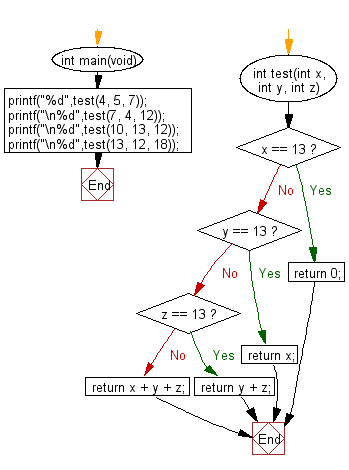C Exercises: Compute the sum of the three integers. If one of the values is 13 then do not count it and its right towards the sum
30. Sum Three Excluding 13
Write a C program to compute the sum of the three integers. Do not count a value that is 13 and add it to the sum.
C Code:
#include <stdio.h>
#include <stdlib.h>
// Function prototype for 'test'
int test(int x, int y, int z);
int main(void){
// Printing the results of calling 'test' function with different arguments
printf("%d",test(4, 5, 7));
printf("\n%d",test(7, 4, 12));
printf("\n%d",test(10, 13, 12));
printf("\n%d",test(13, 12, 18));
}
// Definition of the 'test' function
int test(int x, int y, int z)
{
// Checking if 'x' is equal to 13
if (x == 13) return 0;
// Checking if 'y' is equal to 13
if (y == 13) return x;
// Checking if 'z' is equal to 13
if (z == 13) return y + z;
// If none of the above conditions are met, return the sum of all three arguments
return x + y + z;
}
Sample Output:
16 23 10 0
Explanation:
int test(int x, int y, int z) {
if (x == 13) return 0;
if (y == 13) return x;
if (z == 13) return y + z;
return x + y + z;
}
The function starts by checking if the first integer argument is equal to 13. If it is, then the function returns 0, as specified.
If the first argument is not equal to 13, then the function proceeds to check the second argument.
If the second argument is equal to 13, then the function returns the first argument (excluding the second argument from the sum).
If the second argument is not equal to 13, then the function proceeds to check the third argument.
If the third argument is equal to 13, then the function returns the sum of the first and second arguments (excluding the third argument from the sum).
If none of the arguments are equal to 13, then the function returns the sum of all three arguments.
Time complexity and space complexity:
The time complexity of the function is O(1) as the function has a constant time complexity since it performs a fixed number of comparisons and arithmetic operations that are not dependent on the size of the input.
The space complexity of the function is O(1) as the function uses a constant amount of memory since it only uses a few integer variables to store the input values and the intermediate results.
Pictorial Presentation:
Flowchart:

For more Practice: Solve these Related Problems:
- Write a C program to sum three integers while ignoring any occurrence of 7 in the sum.
- Write a C program to compute the sum of three numbers, skipping any that are multiples of 5.
- Write a C program to add three integers, but if any value is 13, subtract 13 from the total sum instead of ignoring it.
- Write a C program to sum three integers, ignoring any number that is negative.
Go to:
PREV : Sum of Three with Duplicate Check.
NEXT : Sum Three with Conditional Zeroing.
C Programming Code Editor:
What is the difficulty level of this exercise?
Test your Programming skills with w3resource's quiz.
